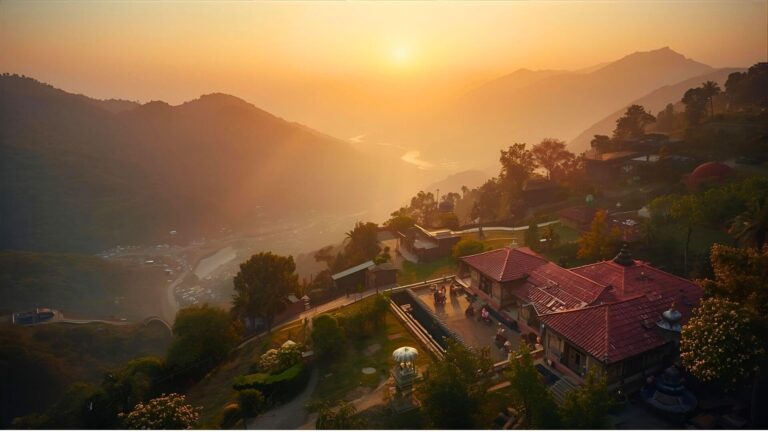
India is the original landscape of meditation. From classical yogic sādhanā to Buddhist insight traditions and modern research institutes, the country offers a spectrum of places to deepen practice. Below are ten historically significant and widely respected meditation hubs across India. Each entry includes what it is, why it matters, and how it fits different practice goals
Dhamma Giri, Igatpuri, Maharashtra
The flagship residential center for S. N. Goenka’s tradition of Vipassana. Ten-day silent courses teach the technique step by step; the center is co-located with the Vipassana Research Institute and includes a large meditation pagoda. Courses are donation-based.
Dhamma Giri catalyzed the modern revival of classical Vipassana from Indian soil into a global network of centers. For many practitioners, it is the reference point for technique-driven, silent, residential meditation.
Good for technique-focused meditators who want a rigorous, structured, silent course. (1)Tushita Meditation Centre, Dharamkot (Dharamsala), Himachal Pradesh
A Tibetan Mahayana Buddhist center in the forested hills above McLeod Ganj offering “Introduction to Buddhism” courses, short retreats, and study programs; clear logistics and seasonal calendars are published.
Sits at the contemporary crossroads of Tibetan Buddhist study and practice in India, with highly accessible entry-level programs.
For those seeking structured teachings on the Buddhist path (ethics, meditation, philosophy) with an international community. (2)OSHO International Meditation Resort, Pune, Maharashtra
A large, urban “meditation resort” with daily active and silent meditations, multi-day programs, and seasonally published rates.
One of India’s most recognizable meditation destinations, it shaped how many first encounter retreat culture in an urban setting.
For explorers of contemporary meditative methods who prefer city access and a curated program schedule. (3)Isha Yoga Center, Coimbatore, Tamil Nadu
Headquarters of Isha Foundation at the Velliangiri foothills. Offers a spectrum of in-person programs and hosts major public events around the Adiyogi complex; visitor information and accommodation portal are public.
A large, modern campus integrating yogic practice, volunteerism, and public cultural events; a magnet for Indian and international visitors. Recent programming highlights its ongoing national profile.
Good for immersive yogic environments with visibility and large-scale events in addition to meditation spaces. (4)Art of Living International Center, Bengaluru, Karnataka
A major ashram offering programs from beginner breath and meditation to advanced silent retreats; center information and contact details are public.
One of India’s most extensive hubs for breath-centric meditation and service activities, with a consistent training pipeline for newcomers.
For breathwork-forward meditation seekers looking for a large, organized campus. (5)Parmarth Niketan, Rishikesh, Uttarakhand
A Ganga-side ashram known for yoga, meditation, daily aarti, and the International Yoga Festival; it runs regular courses and retreats in a traditional rhythm.
Rishikesh is India’s “yoga capital.” Parmarth links river-side ritual life with daily practice, anchoring a high-visibility node for Indian spiritual culture.
Good for travelers who want practice plus sacred geography and cultural immersion on the Ganga. (6)Sivananda Yoga Vedanta Dhanwantari Ashram, Neyyar Dam, Kerala
A classic residential ashram offering Yoga Vacation, meditation immersions, Ayurveda programs, and its four-week TTC; program and accommodation details are public.
Part of the Sivananda network that codified a balanced routine of asana, pranayama, meditation, karma yoga, and satsang in a gurukula setting.
For those who want a traditional schedule with clear daily structure and beginner-friendly entry points. (7)Kaivalyadhama, Lonavla, Maharashtra
Founded in 1924 by Swami Kuvalayananda, Kaivalyadhama is a pioneer of scientific yoga research integrating practice, therapy, and investigation into yoga’s effects; institute programs and research identity are public.
Bridges traditional yoga with modern inquiry; emblematic of India’s evidence-oriented approach to yoga and meditation.
Good for wellness professionals and brands seeking practice environments anchored in research and education. (8)Sri Ramanasramam, Tiruvannamalai, Tamil Nadu
The ashram of Sri Ramana Maharshi at the base of Arunachala, centered on self-inquiry (ātma-vicāra), daily meditations, and quiet practice; official site and publications (Mountain Path) outline its heritage and activities.
A locus of India’s non-dual meditation heritage where silence and inquiry are core method rather than technique-driven protocols. (9)
Good for practitioners drawn to Advaita Vedānta and contemplative silence over structured curricula.Sri Aurobindo Ashram, Puducherry
A living community shaped by Sri Aurobindo and the Mother; collective meditations and visitor guidance are published; limited guesthouse rooms require advance booking.
Represents a modern Indian synthesis of yoga aimed at integral transformation, with meditation embedded in a broader path of work, devotion, and study.
For seekers of an integrative approach who want community life and reflective practice rather than a course-only format. (10)
Two strong Bodh Gaya alternates:
- Dhamma Bodhi (Vipassana, Goenka tradition)
Ten-day courses generally start on the 1st and 16th of each month; center and schedule pages are public with contact and application information. (11)
2. Root Institute for Wisdom Culture (Tibetan tradition)
A semi-monastic center about 2 km from the Mahabodhi complex offering stays, courses, pujas, and retreats; program updates and booking details are public. (12)
How to choose the right place
If you want a silent, technique-based reset with clear method, choose a Goenka-style Vipassana center like Dhamma Giri or Dhamma Bodhi (donation-based, strict code of discipline).
If you want study plus practice in the Tibetan tradition, Tushita or Root Institute fit well (structured introductory curricula and clear guidelines).
If you want integrated yogic routines or teacher training, look at Sivananda Neyyar Dam, Parmarth Niketan, Art of Living, or Kaivalyadhama.
Registration and eligibility
Vipassana centers require advance applications and adherence to a code of discipline; courses fill quickly.
Most ashrams publish program calendars and practical visitor info; some have seasonal peaks or closures.
Vipassana (Goenka tradition) is donation-based. OSHO and several large campuses publish seasonal/program-based rates. Traditional ashrams typically charge modest program or accommodation fees.
Expect silence zones, modest attire, and participation in karma-yoga or community rules when applicable. Tibetan-tradition centers post clear guidelines for a semi-monastic environment.
Every entry above sits on Indian soil and draws directly from Indian lineages: Vedic-yogic meditation, Tibetan Buddhist practice in Himalayan communities, neo-tantric and contemporary gurukula models, and early research-driven institutes. Together they map a living heritage that runs from Rishikesh and the Ganga to Bodh Gaya, the Deccan plateau, the Western Ghats, and the Tamil heartland.
Official pages references:
1. Dhamma.org – Dhamma Giri (Igatpuri) and Vipassana overview: schedules and what to expect.
2. Tushita.info – Tushita Meditation Centre (Dharamkot): programs, FAQs, travel info.
3. Osho.com – OSHO International Meditation Resort (Pune): programs and seasonal rates.
4. Isha.Sadhguru.org – Isha Yoga Center (Coimbatore): visitor info and accommodation.
5. ArtOfLliving.org – Art of Living International Center (Bengaluru): center info and contact.
6. Parmarth.org – Parmarth Niketan (Rishikesh): ashram overview and state tourism listing.
7. Sivananda.org – Sivananda Neyyar Dam (Kerala): ashram and Yoga Vacation details.
8. Kaivalyadhama.com – Kaivalyadhama (Lonavla): institute overview and research identity.
9. Gururamana.org – Sri Ramanasramam (Tiruvannamalai): official site and publications.
10. Sriaurobindoashram.org – Sri Aurobindo Ashram (Puducherry): visitor information and guesthouses.
© 2025 Svety Oklad | Meditation Coach, Digital Creator & Wellness Tech Explorer.
Based in Sri Lanka, working worldwide in content creation, SEO, and WordPress optimization.
Please, send your inquiry via contact form.
Discover my portfolio of mindfulness projects, brand collaborations, and digital media strategies. Follow my journey on Instagram and YouTube for meditation, travel, and creative content.
